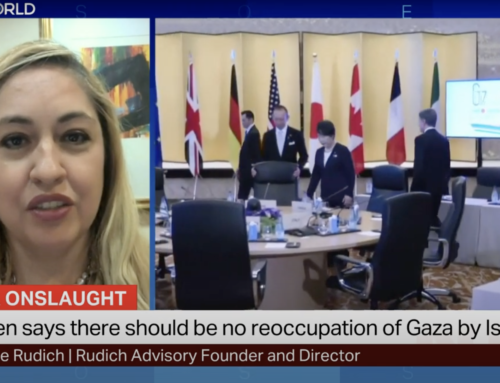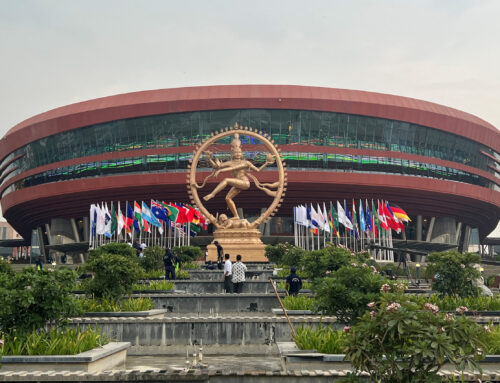G20 Buenos Aires: Despite Low Expectations, Agreement Reached on Financial Crime Initiatives
Expectations were low at the G20 Summit in Buenos Aires that the leaders of the world’s largest economies could reach a concrete agreement and issue a consensus-based G20 Communique at the end of the summit.
This was largely because of the multiple geopolitical crises taking place, including the Russian seizure of Ukrainian ships in the Black Sea, the murder of Washington Post journalist Jamal Khashoggi implicating Crown Prince Mohammed bin Salman of Saudi Arabia and a trade war between China and the United States.
Nevertheless, although the media was rife with gaffes made by the leaders — including plane failure which led German Chancellor Angela Merkel to take a commercial flight to Argentina; Donald Trump, president of the United States, walking off stage during an introduction by Mauricio Macri, Argentina’s president; Emmanuel Macron, the president of France, rebuking Crown Prince Mohammed bin Salman, saying “[y]ou never listen to me …”; and the perceived comradery between Mohammed bin Salman and Vladimir Putin, President of Russia — the leaders came together in recognition of the need to keep talking in an increasingly polarised world.
Against this background, several initiatives were made in the areas of money laundering, corruption and human trafficking of which individuals working in financial services should be aware.
Money laundering and terrorist financing
The important anti-money laundering initiative unveiled at the G20 Summit was the statement that leaders committed to “regulating crypto-assets for anti-money laundering and countering the financing of terrorism [AML/CTF] in line with [Financial Action Task Force] FATF standards”. The beginning of 2018 saw an explosion of crypto assets, with market capitalization reaching $800 billion before plummeting by more than $600 billion. Today, there are approximately 2,000 cryptocurrencies worldwide.
While promoting the democratization of finance and transparency, there has been evidence of crypto assets being used by criminals to launder their ill-gotten gains. It is important to note, however, that this is also a side effect of greater adoption of a new avenue that allows for the transfer of value. In March of this year, G20 finance ministers tasked the FATF to review its crypto-asset guidance and to amend the FATF 40 Recommendations as appropriate. This has led to a change in Recommendation 15, which calls for virtual assets service providers to be regulated for AML/CTF purposes.
G20 leaders also reaffirmed their commitment to “addressing illicit financial flows that have a detrimental effect on domestic resource mobilization” and endorsed the G20 High-Level Principles on Sustainable Habitat through Regional Planning (the Principles). This recognizes that the identification and verification of new customers plays a significant role in enabling financial inclusion and allows for the participation of individuals in society and the economy. The Principles highlight the need for the World Bank to advance the promotion of inclusive identification systems, including through digitization and the adoption of biometrics. The following recommendations were put forward in the Principles, asking countries to:
-
1. Ensure [sic] an integrated identity framework.
-
2. Adapt and upgrade the regulatory framework.
-
3. Establish a robust and secure digital identity infrastructure in the financial sector.
-
4. Foster development of private sector-led services by leveraging legal identity infrastructure.
-
5. Monitor new developments and approaches to identity.
As integrated digital identity frameworks develop, this should allow financial institutions to streamline non-face-to-face verification measures and cut costs. This should also open up the possibility of greater adoption of technologies that will allow for the validation, not verification, of identity from a centralized, government-led national identity hub.
With regard to terrorism and terrorist financing, leaders reaffirmed the “strong condemnation of terrorism in all its forms and manifestations” and committed to step up efforts to fight terrorists and proliferation financing and money laundering. They further urged the digital industry to work together to fight the exploitation of the internet and social media, which is a high-level reference to the G20 Leaders’ Statement on Countering Terrorism issued in Hamburg in 2017. Governments should look to bring together financial institutions, emerging technology companies, traditional hawala payments providers (were willing) and big technology companies to identify how best to combine financial intelligence and intelligence on terrorist activity and radicalization, to enable them to identify terrorist cells and supporting infrastructure more effectively.
Corruption
Preventing and fighting corruption was one of the main policy areas expanded upon at the G20 Summit. Leaders pledged to foster transparency and integrity in the public and private sector and endorsed the Principles on Preventing Corruption and Ensuring Integrity of State-Owned Enterprises (SOEs) and the Principles on Preventing and Managing Conflict of Interests in the Public Sector. This is particularly important as it targets systemic public-sector led corruption by targeting SOEs and identifying conflicts between individuals awarding public tenders and private companies that they may be associated with. More detailed guidance is expected at the G20 Osaka Summit in 2019. This is also particularly relevant against the backdrop of the “corruption notebooks” scandal in Argentina where allegations of the payment of bribes for contracts was documented for 10 years by a chauffeur-turned-whistleblower, implicating many senior politicians.
Leaders also agreed on the new 2019-2020 action plan for the Anti-Corruption Working Group which was set up at the Toronto Summit in 2010. They pledged to continue practical cooperation to fight corruption and other economic crimes and ways to tackle them, and committed to enhanced cooperation to return persons sought for corruption offences and their stolen assets. International organizations have been asked to report back during the Japanese presidency.
And last but not least, leaders called for the effective implementation of the United Nations Convention against Corruption (UNCAC), including the criminalisation of bribery of public officials, and for countries to work toward adherence to the Organization for Economic Cooperation and Development (OECD) Convention on Combatting Bribery of Foreign Public Officials in International Business Transactions.
No mention was made of the need to develop beneficial ownership registries to promote corporate transparency, which has been a significant anti-corruption initiative for several years.
Financial institutions should also be monitoring to identify potential conflicts with their clients who are politically exposed persons or politically exposed person beneficial owners looking to make payments to, issue loans on behalf of, or use funds to invest in, companies that they are affiliated with. They should also make use of available public information on sources of funds for state-owned companies to assess the risk that the company itself, or senior management of the company to which products and services are being provided, may be exploited to hide the ill-gotten gains of corruption.
Human trafficking
Human trafficking is estimated to be worth $150 billion per year and continues to be a significant social issue. The G20 pledged to “take action to eradicate child labour, forced labour, human trafficking and modern slavery in the world of work, including through fostering sustainable supply chains”.
Initiatives such as the public-private partnership between Europol, Traffik, IBM and several top-tier financial institutions including Western Union, Lloyd’s and Barclays that have led to the development of the Traffik Analysis Hub (TAHub) are vital in supporting this commitment made by the leaders. Unveiled in October of this year, TAHub uses artificial intelligence and machine learning to absorb data from multiple sources including law enforcement, non-governmental organisations and financial services to employ an intelligence-led approach to fighting human trafficking. It is a ground-breaking initiative and financial institutions and payment processing firms should consider how best to engage with this initiative to fight human trafficking.
In terms of supply chain management, all organisations subject to the UK Modern Slavery Act and similar legislation that exists worldwide need to ensure that they have accurate risk assessments and controls to determine where their supply chains could be exposed to products developed using child labour. This should include appropriate due diligence as part of the vendor management process, to determine the risk that goods could be produced by slave labour given the jurisdiction where goods are produced, the type of industry and the company’s labour practices. Adoption of tools to promote transparency in the supply chain, such as the Freedom Seal created by human trafficking survivor Rani Hong, could support large corporates in managing risks of modern slavery in their supply chains.
Originally published on Thomson Reuters Accelus
Download “G20 Buenos Aires 2018.pdf”
G20-Buenos-Aires_2018.pdf – Downloaded 905 times – 86 KB




